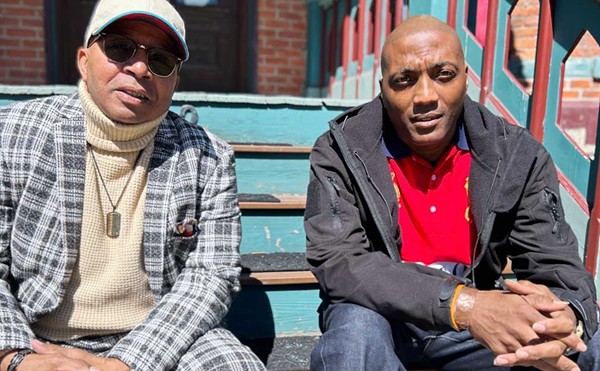Fifty million. That’s how many people have been driven from their countries or uprooted within them in the 1990s, and cast adrift, usually with little or nothing.
Fifty million – and that figure may be low. Hundreds of thousands have been killed; hacked to death in Rwanda, blown away in Somalia, died from artillery fire in Sarajevo. Yesterday morning I had breakfast with one of the few Detroiters still in the real news business, Wayne State University alum Mark Fritz, who won the Pulitzer Prize a few years ago for his reporting on the massacres in Rwanda. Fritz, now with the Los Angeles Times, has just written one of the most important books since the Cold War, Lost on Earth: Nomads of the New World (Little, Brown, $34.95), about the world refugee crisis.
Fifty million adrift, and all of them together haven’t gotten a small fraction of the airtime devoted to the slaying of the child beauty star. You see less of them on the news all the time. Too depressing. Hopeless. Viewers might flee. Best read a line, then move on to the latest fad or the newest fat-whacker drug, then on to our now-perpetual media goddess, Monica.
And what, you ask, does this have to do with Monica?
More than you’d think. We always loved our sex scandals, though sooner or later real news drove the boys and bimbos from the stage. But everything is different now. The thing we wanted most in the world happened, and it brought out the worst in us.
We lost our common enemy, the commies. For decades we had an adversary that united nearly all of us, and was easy to understand. First it was the Great Depression, then the Nazis and Japs. Then the Cold War, the long twilight struggle, us vs. them.
Suddenly, the Soviet Union started changing, wobbling – and vanished in a twinkling, like Tolkien’s dark tower of Sauron, and the wall and the walls came tumbling down, and hordes of blinking pale people from Berlin to the Pacific Ocean were free. Impoverished, confused, ill-clad and directionless, but free.
Enthusiastically, we cheered, and brought our soldiers home. What we didn’t realize is that for many of the newly freed, freedom meant freedom to settle old scores. Marshal Tito, the Yugoslav dictator, ruled with an iron hand, but made his nation of peoples who hated each other refrain from wholesale homicide. He died in 1980, but the system he created tottered along so long as Moscow was feared.
Then wham! The Kremlin weakened, inhibitions fell away, and Serb began killing Croat; Bosnian Serb, Bosnian Muslim; and they’ve only just gotten started in Kosovo, where the hated Albanians dwell. Off in Africa and Arabia, everybody suddenly lacked a patron, or protector, and scimitars, machetes and AK-47s were free to whirl.
The world’s last superpower (us) saw this, and did, basically, nothing.
Thirty years ago, we blundered into the wrong war for the wrong reasons – Vietnam – and got badly burned. OK, we reasoned or rationalized, the world doesn’t want us to be its policeman. Fine! Happily, our isolationist tendencies reasserted themselves. No way anything those murderous Serbs or Hutu do can touch us.
Not our problem, not our fault. So, world, have a nice day, and, Washington, add more men to the border patrol. That’s where we are now, in a silly time where, afraid of news, we wallow in sex, elect a smiling cardboard leader – whose policies are the reflection of the empty mirrors we are – and obsess over the trivial and perverse.
Naturally, this will come back to haunt us, for there are billions of disadvantaged humans swirling in the chaos. We have done virtually nothing to make them respect us, with the exception of a very little, mostly too late, in a few outposts like Bosnia. Last week, a few of our tourists were hacked apart in Uganda. Lots of other peoples harbor growing resentments and envy toward the Great Satan, and some have more than machetes to do mischief with.
That’s why, if I were going to send anybody money now, I’d send some to Lynne Partington, who operates one of the last truly American institutions in Detroit. Freedom House exists in an ancient former convent close by the Ambassador Bridge, and takes in that small trickle of the world’s refugees who stumble into Detroit. Partington, who is paid next to nothing, and a small staff fight for them. She puts them up and feeds them and negotiates with the authorities in the United States and Canada.
Last summer, I told you about Verdiane, a slight, merrily attractive Tutsi woman, whose flowing skirts barely hid the machete scars she got when her family was murdered. An immigration official in Chicago denied her asylum, dooming her to deportation and almost certain death. Lynne fought like a tiger, got a new hearing, got a human immigration judge in Detroit to do the right thing.
On any given day, there are dozens of such stories there. Anyone who wants to visit is welcome; anyone who wants to do something for the refugees is more so.
Somebody once said that there is eventual justice in this world. This scares me. If not for Freedom House, it would scare me more.
Freedom House, 2630 W. Lafayette, Detroit 48216, welcomes questions, donations and volunteers. Call 313-964-4320, write, or e-mail: [email protected].





